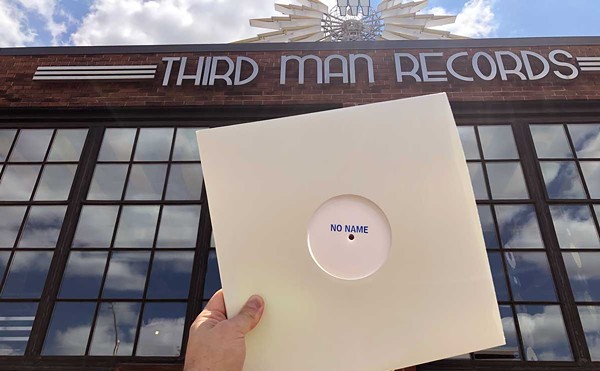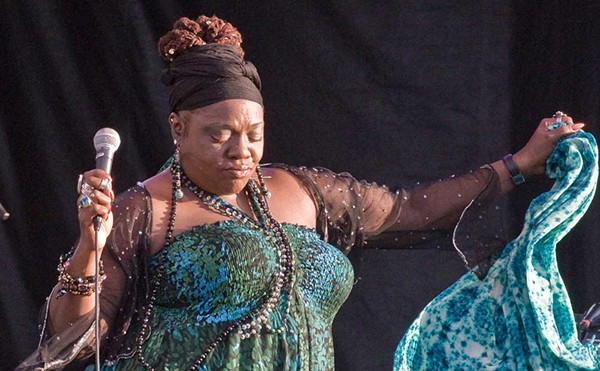Juana Molina has a thing about American record stores. The Argentine singer and songwriter dislikes seeing her subtle and intricate music, which she assembles carefully in solitude over many months and sometimes years, reduced to a single word when it comes time to shelve her CDs. That word? Latin.
"I like how it works in Japan, because there I might be found in many different categories," she says from Los Angeles, a few nights before beginning a U.S. tour in support of her fourth album, Son. "I am under electronica or pop or folk or avant-garde; it's nice to have that chance to be in whatever place you belong. I think I have nothing to do with how Latin music is usually considered."
She's touring with Argentine-born Swede José González in support, and they make their way to Detroit on June 25. Molina will perform alone, just her guitar, keyboards and pedals. On record, her clear, uninflected voice and steady guitar picking dominate, but a bed of subtle electronics augments the acoustic warmth. Meditative and internally focused, sometimes staying on a single chord for minutes at a time as she spins out a melody, her music creates its own small world. Between her muted slow-burn approach and González's fondness for hushed ballads, expect a quiet evening. Quiet, but intense.
Which brings another complication. Her work, though striking, easily falls between the cracks, in part because it sounds so soothing on the surface. Reviewing her third album, Tres Cosas, Entertainment Weekly compared Molina to Nick Drake collaborating with Brian Eno. There's something to the Drake reference — with her breathy voice and droning guitar figures, Molina shares with Drake a style that goes down almost too smooth. Drake was a long deceased cult figure before his "Pink Moon" became the sound track for a Volkswagen commercial and wiled its way into yuppie hearts 30 years after his death, and Molina's songs sometimes share that aesthetic. They can seem like pleasant accents to a tastefully decorated room. But while her sound is certainly agreeable and inviting, a closer listen reveals layers. A peppy tune might dissolve into something shapeless and unclassifiable, or noises might rise to fill the spaces between the notes. Molina's songs always seem to be building or falling apart.
The lyrics, unless you speak Spanish, are a mystery, and that's not going to change. She has no interest in translation or singing in anything but her native tongue.
Molina relays a story about Argentine hero Jorge Luis Borges and the difficulty he had translating William Butler Yeats into Spanish. "And we're talking about Yeats!" she says, exasperated. "Not my poor writing. What I write is very fragile and the language only fits the Spanish understanding, or maybe even just the Argentinean understanding, since I use a lot of words and phrases that are known by people there. The specific vocabulary is very important."
On Son, she sometimes leaves the words behind, cooing and mewing in a feral manner that complements the album's focus on nature. Field recordings made near her home mingle with the plucked nylon strings; bird songs mix with the hiss of wind through the trees and the buzz of insects. This newly organic turn separates Son from her previous work.
"I think what I like the most in the past, I don't know, 100 years," she says playfully, "is listening to and watching the randomness in the behavior of things in nature. It's very inspiring, because these things remain the same but always change." This interest in chance and the sound of mistakes worked in another way for Molina. For several shows on a tour supporting David Byrne in 2004, she had to deal with temperamental electronics. But as the unintended notes and sounds from the half-broken equipment found their way into her songs, she grew to enjoy the way the errors fit.
For melody and structure, Molina draws from music close to her home in Buenos Aires. She's particularly attracted to the folk traditions of Uruguay, Argentina and Brazil, though she claims not to understand how the music she loves informs her own songs. Her father, Horacio Molina, is a singer and bandleader performing tango, which in Argentina is studied with an almost religious devotion. "My parents used to listen to a lot of different kinds of music, and I think everything you hear, even if you're not paying attention, gets through to you. And then you filter everything, and something new becomes alive."
But Molina is no traditionalist. Her inclusion of electronics (damaged or otherwise) and field recordings has triggered comparisons to Björk or Beth Orton, but for Molina, beats and dance music are always beside the point. "What I understand by electronics is something that is looped and you almost don't play it. I think maybe the sounds I program on my keyboards have led people to think that I am an electronic musician, but I don't feel that what I do is electronic. To me, electronic is a band like Underworld." Another skin that doesn't quite fit.
So there's a constant tension in Molina's music between expectation and reality. It's something she's used to now, since music is her second career. In the late 1980s and early '90s, Molina was a popular television comedian in Argentina, eventually starring in her own sketch show, Juana y sus Hermanas ("Juana and Her Sisters"). She wrote scripts and played multiple characters, and the show was extremely successful. Once she decided to pursue music full time in 1996, many Argentineans had difficulty following along. Some were resentful of the jarring transition. Imagine if Sara Silverman had a hit prime-time variety show and then quit to make serious records that sounded like Cat Power.
But Argentina, like the rest of the world, is coming around. Each record sells better, the gigs are getting larger, and she has fewer people coming up to her in the street and saying, "Juana! When are you going to be back on television?" She misses nothing about her former career and has known her whole life that music is where she belongs, even if her music doesn't quite belong anywhere. In that sense, maybe it's only the broadest categories that can hold her. She plays guitar, she sings — maybe she's just pop with an experimental bent. Molina can live with that.
"If pop means to write songs or melodies with lyrics, then yes, why not? I would love to have a label to fit into — it would make things easier. But when you have things that don't belong to any label, then maybe we have to make a new category called 'Unlabeled.' A new spot in the record store."
7 p.m., Sunday, June 25 at the Magic Stick, 4120 Woodward Ave., Detroit; 313-833-9700. With José González and Psapp.
Mark Richardson is a freelance writer. Send comments to [email protected]





